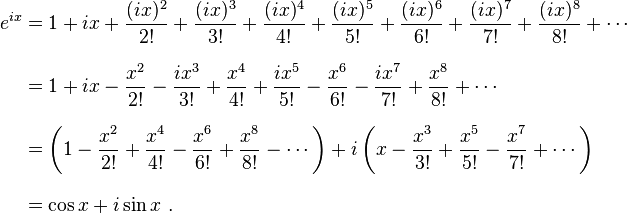e^(pi i) does not equal e^(pi)*e^(i)
@ruler501, check this link:
http://en.wikipedia.org/wiki/Euler's_formula#Proofs It's a bit hard to understand without a backing in calculus though

Generally you can't really conceptualize raising a number to an imaginary power; the main method of going about this sort of thing is creating a power series (a polynomial) that
mimicks the behavior of e^x. e^x's power series (which, when taken to an infinite amount of terms is perfectly accurate) then can be used with imaginary values for x and still make sense.
e^x's power series looks like this:

and so e^(ix)'s power series looks like this:

You'll have to take my word for it that that series is actually cosx+i*sinx. The rest of the proof goes from there.

 So I reposted it.
So I reposted it.

 So I reposted it.
So I reposted it.



